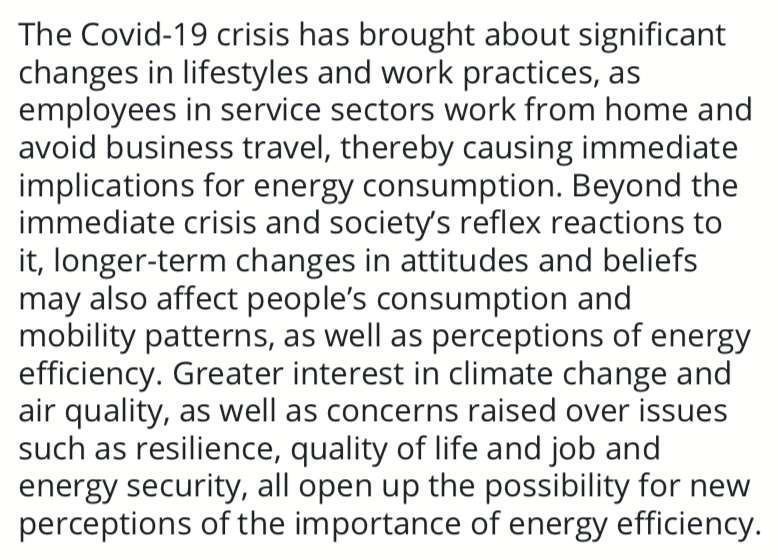Its out! The final report from the @IEA& #39;s Global Commission for Urgent Action on Energy Efficiency is live, and the 10 recommendations provide a clear roadmap for ramping up ambition and action on energy efficiency in Australia and around the world.
https://www.iea.org/reports/recommendations-of-the-global-commission-for-urgent-action-on-energy-efficiency?utm_campaign=IEA%20newsletters&utm_source=SendGrid&utm_medium=Email">https://www.iea.org/reports/r...
https://www.iea.org/reports/recommendations-of-the-global-commission-for-urgent-action-on-energy-efficiency?utm_campaign=IEA%20newsletters&utm_source=SendGrid&utm_medium=Email">https://www.iea.org/reports/r...
First this to say, this is not some musty tome from mid-level bureaucrats. Chaired by the Irish PM @LeoVaradkar, the Global Commission brings together genuine leaders from business and government from around the world: Senator @lisamurkowski, @MLiebreich, @lisadavis and more.
The IEA& #39;s Director, @IEABirol convened the Commission in 2019 to drive the necessary action on energy efficiency to meet our climate goals.
A global pandemic and a catastrophic economic downturn has made the Commission& #39;s work more timely than anyone could have guessed.
A global pandemic and a catastrophic economic downturn has made the Commission& #39;s work more timely than anyone could have guessed.
The Report notes the win-win. Energy efficiency is job intensive, can roll out rapidly and delivers a long term productivity dividend. It& #39;s also some of the most cost effective abatement going around.
TL;DR: investing in energy efficiency saves the climate *and* the economy.
TL;DR: investing in energy efficiency saves the climate *and* the economy.
Recommendation 1 is about a whole of government approach to prioritisation and implementation. The Commissioners have recognised that letting energy efficiency languish in the back office of an environment department won& #39;t unlock this opportunity.
Recommendation 2 focuses on energy efficiency& #39;s huge job creation potential. Energy efficiency upgrades are labour-intensive; we ran the numbers and found a major drive on the energy efficiency of buildings and industry in AU could deliver over 120,000 job-years of employment.
Also a nice little shout-out to the @NABERS_AUS team in Recommendation 2 https://abs.twimg.com/emoji/v2/... draggable="false" alt="👍" title="Thumbs up" aria-label="Emoji: Thumbs up">
https://abs.twimg.com/emoji/v2/... draggable="false" alt="👍" title="Thumbs up" aria-label="Emoji: Thumbs up">
Recommendation 3 is about creating demand for energy efficiency. Minimum standards, energy performance labelling and incentives for replacing inefficient tech. We& #39;ve done a bit on this in Australia – but could do a lot more.
Recommendation 4 is on finance. Short term, we& #39;re talking stimulus, focused on & #39;vulnerable communities, social housing, health care, education and other priority sectors& #39;.
Medium and long term, its about attracting private capital. Create robust frameworks – like @NABERS_AUS – and the private sector will invest.
We need those frameworks in residential – mandatory disclosure of energy performance anyone? – industry and more
We need those frameworks in residential – mandatory disclosure of energy performance anyone? – industry and more
Recommendation 5 is on digitalisation and the system-wide efficiency it enables. Call it what you like – digital energy efficiency like the @IEA, active efficiency like @ToSaveEnergy – this is the holy grail. Unlocking site and system benefits while saving a shedload of money.
Recommendation 6 is VERY important in a stimulus context: governments need to lead by example. Governments are best placed to drive immediate investment in public assets like schools and hospitals, because it can both fund the activity and make the decision.
However government leadership is ALWAYS important. In Australia we talk about it creating an & #39;enabling ecosystem& #39; – demand for energy efficiency products and professionals – that the private sector can then leverage. And the capital expenditure ↓ opex = no-brainer.
Okay hang in there. We& #39;re in the home stretch...
Recommendation 7 – engage all parts of society – might seem touchy-feely. But a lot of stuff in the energy efficiency basket only works if people are engaged, and the motivations and obstacles faced by particular households and businesses are really different.
There is no way of sugar-coating it: if we don& #39;t get down on the ground and get to know these communities – understand what the opportunities and barriers are for THEM – we don& #39;t unlock the energy efficiency opportunity. This stuff is granular, complex even. Deal with it!
Recommendation 8 is a companion to 7 – leverage behavioural insights. Behavioural science has taught us that human beings are not utility maximising economic agents. We& #39;re motivated – and de-motivated – by a bunch of stuff that doesn& #39;t sit neatly in economic models.
Building those insights into policy will give us much better outcomes.
Short digression – one thing COVID-19 has taught us is how much of how we do things is cultural. With the right motivation, we can change things quickly. The Commission is alive to that possibility!
Short digression – one thing COVID-19 has taught us is how much of how we do things is cultural. With the right motivation, we can change things quickly. The Commission is alive to that possibility!
Love this one. Recommendation 9. Strengthen international collaboration. I know we are all precious, unique flowers, but we don& #39;t have time for each country in the world to solve these problems in a silo. We have much to learn from each other. Plug in https://www.iea.org/areas-of-work/international-collaborations/energy-efficiency-hub">https://www.iea.org/areas-of-...

 Read on Twitter
Read on Twitter






 " title="Also a nice little shout-out to the @NABERS_AUS team in Recommendation 2https://abs.twimg.com/emoji/v2/... draggable="false" alt="👍" title="Thumbs up" aria-label="Emoji: Thumbs up">" class="img-responsive" style="max-width:100%;"/>
" title="Also a nice little shout-out to the @NABERS_AUS team in Recommendation 2https://abs.twimg.com/emoji/v2/... draggable="false" alt="👍" title="Thumbs up" aria-label="Emoji: Thumbs up">" class="img-responsive" style="max-width:100%;"/>





